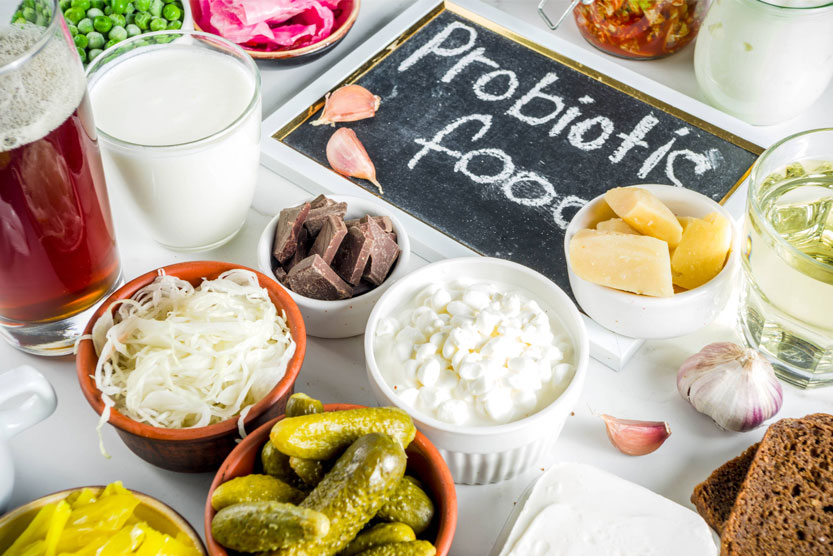For thousands of years, cultures around the globe have harnessed the power of fermentation. This ancient culinary art, which gave us delights like sauerkraut, kimchi, and kefir, is more than just a means to preserve food – it’s a cornerstone in the edifice of optimal health. But in today’s world, where every food item comes with its list of pros and cons, it’s crucial to ask: Are fermented foods a gut health miracle or a hidden risk?
The connection between fermented foods and gut health is profound. These foods are natural troves of probiotics – beneficial bacteria that play a pivotal role in digestion, nutrient absorption, and supporting our immune system. A healthy gut microbiome, fostered by a diet rich in fermented foods, is not just about better digestion; it’s about a body that functions at its peak, a robust immune system, and even a clearer, more focused mind.
However, amidst this praise, there’s a swirl of myths suggesting that fermented foods might be harmful to those with gut issues. Let’s dispel these myths. While it’s true that for a small percentage of people with certain health conditions, such as histamine intolerance or certain allergies, fermented foods might pose challenges, for the vast majority, these foods are not just safe but beneficial. The key is to listen to your body and introduce these foods gradually.
Now, let’s explore the top 7 fermented foods that are celebrated for promoting a healthy microbiome:
- Sauerkraut: Beyond its probiotic power, sauerkraut is a fiber-rich food that aids in digestion. It’s also a great source of vitamins C and K, and its antioxidants are excellent for overall health.
- Kimchi: This spicy Korean staple is not only a probiotic powerhouse but also rich in vitamins A and B, and minerals like iron, calcium, and selenium. The fermentation process also enhances its antioxidant properties.
- Kefir: More potent than yogurt, kefir contains several major strains of friendly bacteria and yeast, making it a diverse and potent probiotic source. It’s also rich in calcium and protein and can be a good option for those who are lactose intolerant.
- Kombucha: This fermented tea is a source of probiotics and contains antioxidants that can kill harmful bacteria and may help fight several diseases. Its unique compounds also promote liver health.
- Miso: Made from fermented soybeans, miso is not just a probiotic-rich food; it’s also packed with essential minerals and a good source of B vitamins, E, K, and folic acid. Miso’s fermentation process makes these nutrients more easily absorbable.
- Tempeh: A fermented soy product, tempeh is not only a great probiotic but also a fantastic source of protein, making it a popular meat substitute. It’s high in vitamins, including B12, and minerals like magnesium and phosphorus.
- Yogurt: Especially those varieties that are labeled as containing live, active cultures. Yogurt is a well-known source of calcium, protein, vitamins B6 and B12, riboflavin, potassium, and magnesium. The probiotics in yogurt can help with digestion and offer protection against harmful bacteria.
While these fermented foods are beneficial, they are different from taking probiotic supplements. Fermented foods provide a diverse array of bacteria and often contain prebiotics, which help nourish these beneficial bacteria. Probiotic supplements, on the other hand, offer specific strains in concentrated doses, which can be particularly beneficial for addressing certain health conditions. Both have their place in a holistic approach to gut health.
However, navigating the world of gut health, fermented foods, and probiotics can be complex. This is where functional medicine shines. As a functional medicine practitioner, I focus on a personalized approach, understanding that each individual’s gut health journey is unique.
If you’re intrigued by the potential of fermented foods in enhancing your health, or if you’re wondering how to balance them with probiotics, I invite you to book a complimentary discovery call with me. Together, we can explore how a functional medicine approach can address your specific needs and concerns, helping you to achieve optimal health through a tailored plan that might include diet modifications, lifestyle changes, and possibly supplementation.
Remember, your journey to health is unique, and it deserves a personalized approach. Let’s work together to explore the wonders of fermented foods and the broader spectrum of gut health strategies.
Looking forward to our conversation,
Dr. John Dempster, ND
P.S. Your gut health is the foundation of your overall well-being. Don’t leave it to guesswork. Book your complimentary discovery call today, and let’s embark on a journey to vibrant health together!


